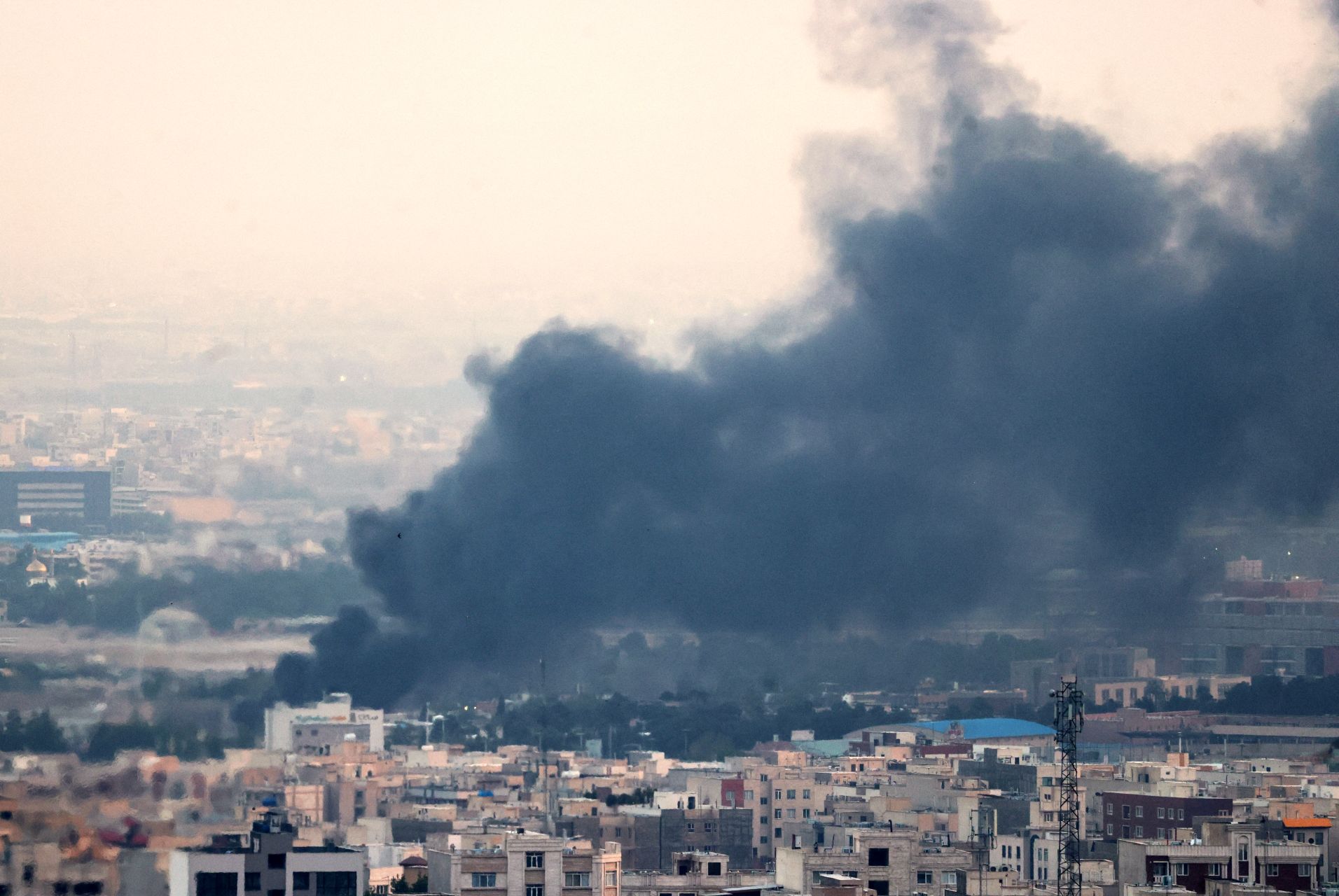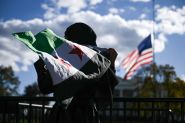- Home
- Middle East
- Iran-Israel War: Latest Developments on Day 10

Smoke from an explosion in southwest Tehran billows on June 16, 2025. ©Atta Kenare / AFP
US strikes on three Iranian nuclear sites "devastated" Iran's nuclear program, the Pentagon said on Sunday, as Washington insisted it was not seeking a change of government in the Islamic republic following its intervention alongside Israel.
With the Iran-Israel in its 10th day, here are the latest developments:
US intervention
US Defense Secretary Pete Hegseth said the strikes ordered by President Donald Trump overnight had "devastated the Iranian nuclear program", but "did not target Iranian troops or the Iranian people".
Trump "seeks peace", Hegseth told a Pentagon press briefing, adding: "This mission was not, and has not, been about regime change."
Vice President JD Vance said on Sunday that the US air strikes had "set the Iranian nuclear program back substantially last night, whether it's years or beyond.
Earlier, Trump said the US had carried out a "very successful attack on the three Nuclear sites in Iran", referring to Isfahan, Natanz and the underground uranium enrichment facility at Fordo.
Iranian media also said the three sites were hit.
US Joint Chiefs Chairman Dan Caine said seven B-2 stealth bombers had flown 18 hours from mainland America to carry out the attack.
He said the planes dropped 14 bombs known as the GBU-57 -- a powerful 13,600-kilogram (30,000-pound) bunker-busting weapon that made its combat debut in the Iran operation.
Trump said that after the strikes, Iran "must now agree to end this war", insisting that under no circumstances should it possess a nuclear weapon.
Israeli Prime Minister Benjamin Netanyahu said his country's campaign had "achieved a great deal, and thanks to President Trump, we have moved closer to our goals".
The UN Security Council held an emergency meeting Sunday following the US strikes, with Secretary-General Antonio Guterres warning against "descending into a rathole of retaliation after retaliation".
Iran says US decided to 'blow up' diplomacy
Iran's top diplomat, Abbas Araghchi, accused the United States of deciding to "blow up" diplomacy with its intervention in the war.
In a post on X, Araghchi said Israel had derailed nuclear talks between Tehran and Washington with its initial strikes on June 13. The US strikes on Sunday did the same to negotiations with European powers held this week.
Addressing European calls for Iran to return to negotiations, he asked: "How can Iran return to something it never left?"
At a news conference in Istanbul later, he said the United States and Israel had crossed a "big red line" by attacking Iran's nuclear sites.
Iranian President Masoud Pezeshkian condemned the United States, saying the attack revealed it was the "main factor behind" Israel's military campaign in the Islamic republic.
He later appeared at a protest held in Tehran to denounce the strikes.
US Secretary of State Marco Rubio accused Iran of entering into "fake negotiations" ahead of the strikes in a bid to "play" Trump.
"I think the world today is safer and more stable than it was 24 hours ago," he told Fox News.
He said the United States would allow Iran to operate nuclear power plants, but not enrich its own fuel.
Araghchi later travelled to Moscow for high-level "consultations" on the latest developments.
Iran and Israel trade fire
Iran's armed forces said they had targeted multiple sites in Israel, including Ben Gurion Airport, after the US attacks.
The targets also included a "biological research" facility, logistics bases, and various layers of command and control centers, it said.
IRNA news agency said 40 missiles had been fired in Iran's "20th wave" of strikes.
At least 23 people were wounded, and police said at least three hits had been reported.
Pezeshkian said in a call with French President Emmanuel Macron that the United States must also "receive a response to their aggression".
The leaders of France, Germany, and Britain called on Iran "not to take any further action that could destabilize the region".
The Israeli military said its "jets struck dozens of military targets throughout Iran" Sunday, including a long-range missile site in Yazd in the centre of the country.
The Tasnim news agency later reported nine Revolutionary Guard members had been killed in strikes on two military bases in the city.
Israel also reported more strikes in the evening in Iran's west and in Tehran.
Tehran governor Mohammad Sadegh Motamedian told state TV that "more than 200 locations have been attacked" across the capital since the start of Israel's campaign.
Watchdog says 'no increase' in radiation
The UN's International Atomic Energy Agency said it had not yet detected any increase in radiation levels at key nuclear sites in Iran after the US strikes.
The UN body's head, Rafael Grossi, said the IAEA would hold an "emergency meeting" at the organization's headquarters in Vienna on Monday in response to the US strikes.
Red Crescent says no deaths in US strikes
The head of Iran's Red Crescent Society, Pir Hossein Kolivand, said that there had been no fatalities in the US attacks, state television reported.
Iran's health ministry acknowledged that the strikes had wounded an unspecified number of people, but none "showed any signs of radioactive contamination" after seeking treatment.
AFP
Read more



Comments